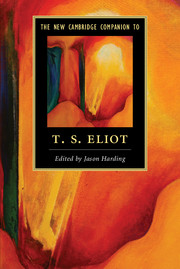Book contents
- Frontmatter
- Contents
- Notes on contributors
- Preface
- Chronology of Eliot's life and works
- List of abbreviations
- 1 Unravelling Eliot
- 2 Eliot: Form and Allusion
- 3 Prufrock and Other Observations
- 4 Banishing the Backward Devils: Eliot's Quatrain Poems and “Gerontion”
- 5 With Automatic Hand: The Waste Land
- 6 “Let These Words Answer”: Ash-Wednesday and the Ariel Poems
- 7 Four Quartets
- 8 “A Precise Way of Thinking and Feeling”: Eliot and Verse Drama 116
- 9 T. S. Eliot as Literary Critic
- 10 T. S. Eliot's Social Criticism
- 11 Gender and Sexuality
- 12 Eliot's Philosophical Studies: Bergson, Frazer, Bradley
- 13 “Anglo-Catholic in Religion”: T. S. Eliot and Christianity
- Select bibliography
- Index
- Miscellaneous Endmatter
7 - Four Quartets
Published online by Cambridge University Press: 01 December 2016
- Frontmatter
- Contents
- Notes on contributors
- Preface
- Chronology of Eliot's life and works
- List of abbreviations
- 1 Unravelling Eliot
- 2 Eliot: Form and Allusion
- 3 Prufrock and Other Observations
- 4 Banishing the Backward Devils: Eliot's Quatrain Poems and “Gerontion”
- 5 With Automatic Hand: The Waste Land
- 6 “Let These Words Answer”: Ash-Wednesday and the Ariel Poems
- 7 Four Quartets
- 8 “A Precise Way of Thinking and Feeling”: Eliot and Verse Drama 116
- 9 T. S. Eliot as Literary Critic
- 10 T. S. Eliot's Social Criticism
- 11 Gender and Sexuality
- 12 Eliot's Philosophical Studies: Bergson, Frazer, Bradley
- 13 “Anglo-Catholic in Religion”: T. S. Eliot and Christianity
- Select bibliography
- Index
- Miscellaneous Endmatter
Summary
Four Quartets is in many ways a work of purification and purgation, linguistically and morally, and one which strives to “dispossess” itself of the world and its “distractions” in its quest for the absolute. The more severe and homogeneous diction of Eliot's later style, heralded in the 1929 essay on Dante – “one has learned from the Inferno that the greatest poetry can be written with the greatest economy of words, and with the greatest austerity in the use of metaphor, simile, verbal beauty, and elegance” (CP3 712) – means that the multiple discourse of the earlier work – the quotations in foreign languages, the presence of dialect, jazz idiom, nursery rhyme, all The Waste Land's different voices, as well as its multifarious personae – has disappeared. What we rather have in Four Quartets is the “I” persona in a state of prolonged spiritual self-communing within a pronounced doctrinal context, with a good deal of iteration of some of the poem's key points: “You say I am repeating / Something I have said before. I shall say it again” (CPP 181). If this suggests that Four Quartets remains primarily the preserve of the religious interpreter, a significant amount of recent criticism has emphasised historical contexts and occasions, focussing on the poem as a document of the Second World War, and indeed the later three Quartets, East Coker, The Dry Salvages and Little Gidding, published in 1940, 1941 and 1942, respectively, are heavily imbued with wartime experience. But whatever the social, political or “patriotic” interventions Four Quartets can be seen as making, these cannot be divorced from religious positions that heavily inflect the topical commentary the poem has to offer, and to neglect such positions precisely obscures the insistent dialogue between religion and “history” that takes place throughout. In Jed Esty's words, Four Quartets is not “a retreat from history into religion” but a “confrontation” between the two. I will return to this issue at the end of this chapter, pursuing in the meantime the poem's religious narrative particularly in relation to its abiding consciousness that, as Little Gidding puts it, “History may be servitude, / History may be freedom” (CPP 195).
- Type
- Chapter
- Information
- The New Cambridge Companion to T. S. Eliot , pp. 103 - 115Publisher: Cambridge University PressPrint publication year: 2016
- 1
- Cited by



